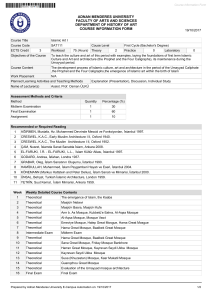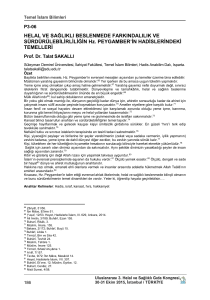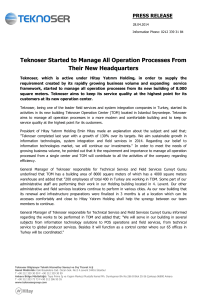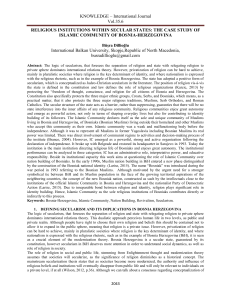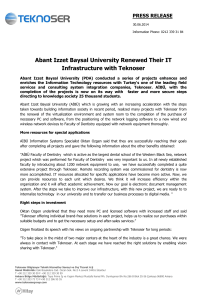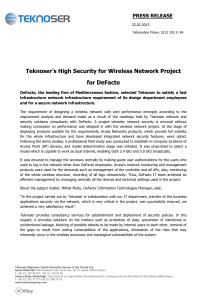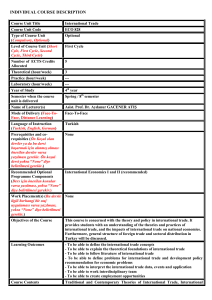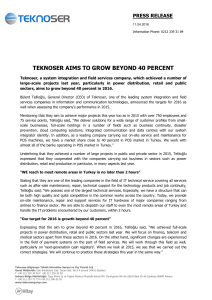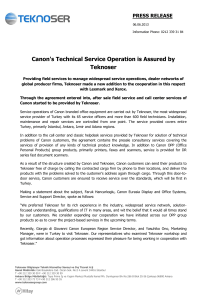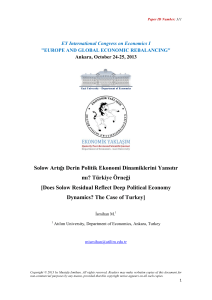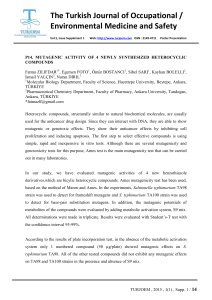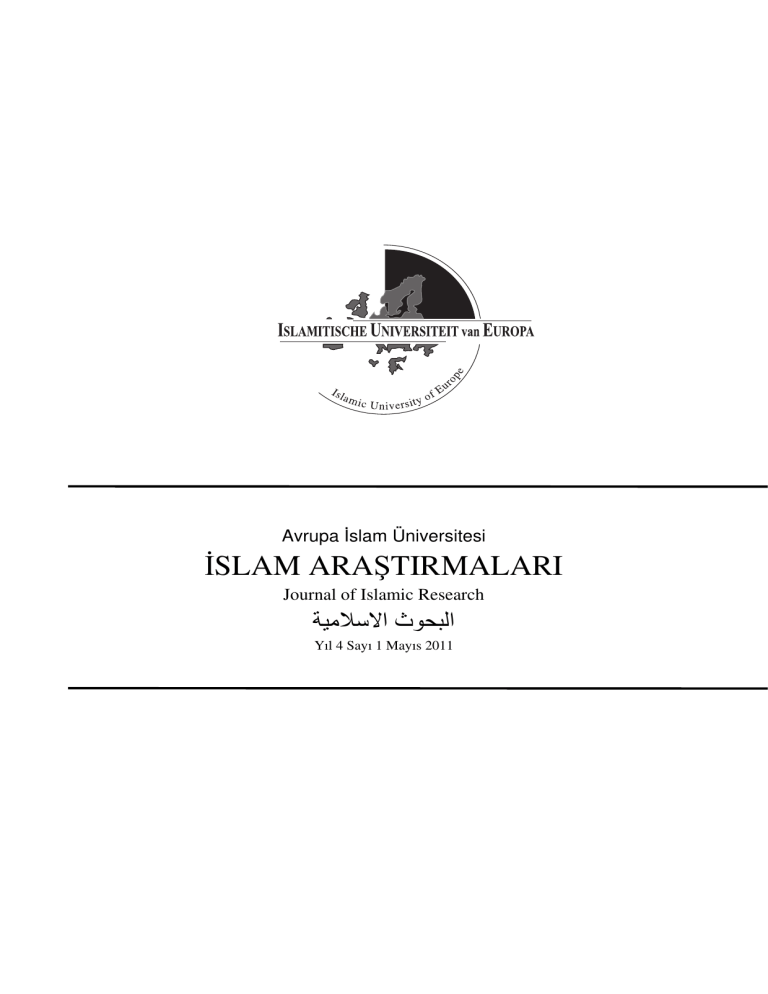
Avrupa İslam Üniversitesi
İSLAM ARAŞTIRMALARI
Journal of Islamic Research
البحوث االسالمية
Yıl 4 Sayı 1 Mayıs 2011
İSLAM ARAŞTIRMALARI
ONTOLOGICAL AND MORAL
FUNDAMENTALS OF THE
RELATIONSHIP BETWEEN GOD
AND THE INDIVIDUAL IN ISLAMIC
THOUGHT
Ass. Prof. Dr. M. Nesim Doru
Şırnak University, Faculty of Divinity, Department of Islamic Philosophy
mndoru@sirnak.edu.tr
Introduction
Humans are two dimensional beings. On the one hand, they have an active
conciousness, will and creativity. On the other hand, they are passively
bound to these conditions. For this reason, sometimes man sees himself as
quite strong and sometimes, in the face of being, quite weak.1 The product of
this dual nature of humanity is a multitude of philosophies and religious
beliefs which take either the physical body or the mind and spirit as the main
foundations.2
This work will examine the different understandings of these in Islamic
thought. The central concept is therefore “humanity”. We will examine the
God-human relationship in Islamic thought within this concept.
From “Islamic Thought” our goal is theology (Kalam), philosophy and
sufism (Tasavvuf). Consequently, in our research we will not consider the
unsophisticated perspectives found in Islam, as a religion since an
examination of interpretations of the God-human relationship in religious
texts is outside the scope of this article.
1
Takiyeddin Mengüşoğlu, Felsefeye Giriş, Remzi Kitabevi publication, Istanbul, 1997, p.
253–4.
2
Takiyeddin Mengüşoğlu, Felsefeye Giriş, p. 256
70 Yıl 4 Sayı 1 Mayıs 2011
İSLAM ARAŞTIRMALARI
Islamic thought means far more than just religious texts. In Islamic thought,
the God-Human relationship may be expressed more or less than in the
Quran and the Prophet’s hadiths. For example, in the Quran, God is
represented in a ‘pure’ way while in Theology discusses God more in terms
of a person or an attribute. Consequently, these views have emerged in
theology:
1- God as a individual
2- God as both an individual and as an attribute
3- The attributes of his being
4- The attributes outside his being
5- The attributes from both inside and outside his being
The view of God/Allah in text has been lost in this debate. As a result, the
concept of God/Allah in theology has become something other than the
God/Allah in holy texts. On the other hand, the God-human relationship of
creator and created, as seen in the Quran, has become something similar to
that of Aristotle’s cosmic presence, the “first mover” (al-muharrik alawwal) or the “One” found in Plato’s system. In Sufism, however, the
Quran’s ontological take on God/Allah, as separate from man, considering
the lover-beloved (‘aşiq-ma’şuq) relationship.3
Therefore, God, in the schools of Islamic thought, has become a logos rather
than a praksis as it appears in the Quran. The Quran presents God as a verb,
a behaviour or a means of positioning, while schools of Islamic thought see
God as something that can be understood, as the definition, proof and object
of theoretical thought.4
To put forward the systems for individual descriptions of Islamic thought,
one must look at how the relationship between God and the individual are
formed. Islamic texts describe the relationship between God and the
individual is an ontological relationship between the creator and the created,
the epistemological relationship between the revealer and that who received
the revelation and a moral relation between the Lord and slave.5 In this
work, how these types of relationships are understood in Islamic thought
from an ontological and moral perspective will be examined. First of all, the
place of the individual in Islamic thought’s cosmological ideas and the
Toshihiko Izutsu, Kur’an’da Allah ve İnsan, translated by Süleyman Ateş, Yeni Ufuklar
Neşriyat, Istanbul, n.d., p. 61–6
4
Hasan Hanefi, “Teoloji mi Antropoloji mi?”, translated by Mustafa Sait Yazıcıoğlu, Ankara Üniversitesi İlahiyat Fakültesi Dergisi, vol. XXIII, p. 512
5
Toshihiko Izutsu, Kur’an’da Allah ve İnsan, p. 95–6; İlhami Güler, “Allah-İnsan İlişkisinin
Ahlâkî Boyutu (Allah’ın Kulları mıyız?)”, İslami Araştırmalar, vol. 5, no. 3, 1991, p.194–5
3
Yıl 4 Sayı 1 Mayıs 2011 71
İSLAM ARAŞTIRMALARI
philosophical context must be defined. On the other hand, the relationship
between divine and human actions in the light of debates over human freewill must be taken into consideration.
1.Basis of Individual Recognition in Islamic Thought
Islamic theology’s school of thought focuses primarily on God’s person and
attributes. The result of these debates is that a theo-centric and monist
understanding of God emerged. Whether through outside influence such as
Christian thought6 or whether through internal influence, the first theologists
prefered the verses of the Quran which express transcendence (tanzih) more
than anthropomorphism (tashbih). Most Mu’tazilah theologians used the
analogy’s (qiyas) jurist (fâqîh) of understanding which is based on
metaphisics resembling the physical world. However, they prefered to use
tenzih when looking at elements resembling the physical world.7 This
approach has led them to ignore the attributes of God. At the same time, the
Mu’tazilah theologians rely on Aristotelian and Neo-Platonic notions in an
attempt to defend their positions.8
Mu’tazilah scholars predicted a conception of an essentially teo-centric
world. In their thought “God is one, without equal, who hears and sees. As
God has no body, imagination, flesh, blood, being, substance or property,
there is no question of colour, taste, scent, touch, heat, cold, wet, dry, height,
width or depth. Unity and division, movement or stillness and decomposition
are not possible. God has no parts and pieces, organs and limbs. He has no
left and right, no front and back or top and bottom. He can not be contained
by space, time has not effect on him. The words of the living can in no way
describe him. He is not limited in time or space. He was not born nor can
give birth. He has no measurements. The senses can not detect him. He can
not be compared to a human and resembles the created in no way. Minds
can not comprehend him. There is no God but God.”9 With these views, the
Mu’tazilah reject all notions of being able to understand or conceive God.
The Mu’tazilah understanding of God is that of the transcendence. One of the
reasons for this is that they divide the world into the ancient (qadim) and the
originated (hâdith). Ancient is God’s most distinctive quality. God does not fit
into any category of originated.10 Next to him, everything is originated, so
much that their existence and non-existence are equal. Their main concern is
6
H.Austryn Wolfson, The Philosophy of The Kalam, Cambridge & London, 1976, p.363
İlyas Çelebi, “Mu'tezile'nin Klasik İslâm Düşüncesindeki Yeri Ve Modern Döneme Etkileri”, Kelam Araştırmaları 2:2, 2004, p. 7
8
Macit Fahri, İslam Felsefesi Tarihi, translated by Kasım Turhan, İklim publication,
Istanbul, 1992, p. 55
9
Abu al-Hasan al-Ash’ari, Maqalat al-Islamiyin, al-Maktabah al-Nahdha al-Misriyya,
Cairo, 1950, vol. 1, p. 216
10
Zuhdi Jarallah, Al-Mutazila, Beirut, 1974, p. 61
7
72 Yıl 4 Sayı 1 Mayıs 2011
İSLAM ARAŞTIRMALARI
hold God separate from a world containing evil, want and corruption. A second concern is to distance themselves from the anthropomorphism deriving
from Christian theologians’ theories of trinity and incarnation. But from these
two concerns have emerged a system in which God and humanity are separated by an insurmountable distance. In this system, God and the individual
are two different beings. But God is the dominant element at the centre. Indeed, he is so dominant that it is not possible to come across anything that
suggests that the individual has any autonomy.
It can not be said that Sunni Islamic theology is different from Mu’tazilah
theology. It is accepted that the most Ash’ari theologians in particular were
under the influence of the Mu’tazilah theologians.11 Sunni theologians on
principal accept the ancient and originated categories of being. They
attribute this separation to the substance-property theory. According to this,
the physical world derives from substance and property and necessarily
requires a creator.12 Physical beings do not possess a definite nature and as a
cause what is seen is a composition of individual habits. Within God’s
cause-effect relationship, claiming that he brought about events means that
his power is being restricted.13 The Sunni theologians have, with their calls
to an understanding of an anthropomorphic God an approach which negates
the God-Human resemblance.14
Ultimately, to the Sunni theologians, the individual is something which is
‘weak’ and ‘lacking’ without control over his own actions next to God.
Additionally, the Sunni theologians announced that the universe’s creation
and oversight was an absolute victory of a construction process which
‘nullified’ the individual done with an indeterminist approach.
Islamic philosophers developed their thought around the emanationism
(sudûr theory). Farabi and Ibn Sina divided existence into the necessary and
the possible and described the creation of existence as a kind of ‘necessary’
state. Farabi's philosophy of a obligatory existence is at its essence the
reason for the other existences. While not being its opposite but also not its
partner, impossibility’s description and not thinking of non-existence is
difference from a perception of being a unique order of existence and outside
matter and form and an eternal existence.15 Possible existences, however, are
lacking from the perspective of existence and are equal existences to existing
11
Ibn Taymiyya, Dar Ta'arud al- 'Aql wa al Naql, ed. Muhammad Rashad Sa'im, , Jami'at alImam Muhammad Ibn Sa'ud al-Islamiyyah, Riyadh, 1991, vol. 9, p. 333
12
Abu'l Ma'ali al-Juwayni, Kitab al-Irshad, Mu'assasa al-Kutub al-Thaqafiyya, Beirut, 1985,
p. 40
13
Abu Hamid Al-Ghazali, Al-Iqtisad fi al-itiqad, Cairo, n.d., p.42–51
14
Yunus Şevki Yavuz, “Maturidiyye”, DİA, Ankara, 2003, vol. 28, p. 170
15
Abu Nasr al-Fârâbî, Kitab ara' ahl al-madinah al-fadilah, Dar Al-Mashriq, Beirut, 1986, p. 37
Yıl 4 Sayı 1 Mayıs 2011 73
İSLAM ARAŞTIRMALARI
and not existing. Beings are in debt to the necessary existence. For this
reason, beings are not capable of defending existence on their own.16
In Ibn Sina’s ontology put forward an exaggerated division of existence into
necessity and possibility. According to him, necessary existence is the
reason and possible existence is the result. Necessary existence is single
while possible beings are many.17 Necessary existence is stable while
possible beings change and between them there are insurmountable barriers.
According to him, necessary existence is absolutely perfect, absolute
goodness and absolute intelligence. It is at once being intelligent, giving
intelligence and becoming intelligent.18
For example, Islamic philosophers speak of these exaggerated thoughts with
respect to God’s oneness in terms of God’s transcendence. According to
them, God is a truth which can not be compared to any being. He is a unique
being. His existence has a nature unlike any other. He is One such that he
can not share his existence with any other being or individual. This is a
necessary part of his nature. Whatever the meaning of an individual’s
necessary nature is, being one is the same thing. As in the case of physical
obsejct, existence and destruction do not have plenty and contrast. In this
way, there is no equal, resemblance, partner or opposit in this union. No
other necessary being which shares the same necessity or which can create
an opposite can be imagined.19
Islamic philosophers explain the existence of the theory of applied
emanationism, expressed as the pyramidal hierarchical reality. Those which
are excessive and innate are regarded as two distinctly separate categories of
beings. On top of the pyramid is the First Reason, God. Below him are the
less perfect Second Reasons (intellect and heavenly bodies). The third most
perfect being is the efficient intellect (al-aql al-Fa’al). Efficient intellect is
the intermediary between the innate universe and the excessive universe and
takes names like al-Ruh al-Amin, al-Ruh al-Quds and Gabriel.20 Below the
imminent universe is found the first matter (heyûla). After it and upwards
come the four elements (air, water, earth and fire), plants, animals and
human. These orders take the names matter, copy and soul.21
16
Abu Nasr al-Fârâbî, Al-Siyasa al-madaniyya, ed. Fauzi M. Najjar, Im- primerie Catholique,
Beirut, 1964, p. 56 and 60; Ibn Sînâ, Kitab al-najat, Dar al-jiyl, Beirut, 1992, vol. 2, p. 79
17
Ibn Sina, Kitab al-shifa' al-ilahiyyat, edited by Ibrahim Madkour, n.d., vol. 1, p. 37
18
Ibn Sina, Kitab al-shifa' al-ilahiyyat, vol. 2, p. 355–7
19
Ibn Sînâ, Kitab al-najat, vol. 2, p. 84
20
Abu Nasr al-Fârâbî, Al-Siyasa al-madaniyya, p. 32
21
Abu Nasr al-Fârâbî, Kitab ara' ahl al-madinah al-fadilah,p. 66
74 Yıl 4 Sayı 1 Mayıs 2011
İSLAM ARAŞTIRMALARI
When analysed from the point of the individual, it is possible to speak of two
drawbacks to the he exaggerated point of a separation between the necessary
and possible and the sudur theory’s hierarchical pyramid form.
1- This theory, as it makes a virtual distinction of existence, brings
forth an imagination of broken existence and phenomenons. The
separation between metaphysical and physical, such as the division
between broken objects such as the two worlds – one of God, one of
man – and thus two different beings and two different unions
(definitional one, real plurality).22 When considering he sudur theory’s
Aristotlean dualism between matter-shape, reason-reasoned,
substance-property (jawhar-‘araz), stable-changing and its maniheistic
and gnostic notions such as spirit-matter, soul-body and fall-rise, it is
easier to understand the broken form’s violence and dimensions.23
2- As can be seen in our descriptions, this theory imagines a vertical
universe which gets smaller and more lacking as we move from top to
bottom and rests on a vision which is basically transcendence as in the
theological school. The theory which regards the possible as nearly
non-existant has notions such as first, absolute, principle, empyreal,
supernatural and non-human and it gives birth to an understanding of
an intert God which, to the opposite of the abstract principle which
leaves the individual in an empty space, opens the door to a deistic
belief.24 Thanks to this transcendence approach – in particular that of
Ibn Sina – on one hand the possible existence is discounted while on
the other hand it takes the basic possible existence is the total
existence from man and gives it to God. God is both the giver and
receiver of intellect and it leaves nothing for humanity when there is
intelligence.25
The greatest response to the dualistic approach of Islamic philosophers came
from the Sufi school. The Islamic Sufi movement rejected these rigid categorical distinctions of the theologians and philosophers. According to them,
the distinction between the ancient and the originated, the obligation and the
possible are fundamentally wrong. There is one being and that is God’s being. The plenty seen in the word are the various visions of the relative and
22
Şahin Filiz, “İslam Felsefesi’nde Tanrı Anlayışı Karşısında Bireyin Konumu Problemi”,
Ankara Üniversitesi İlahiyat Fakültesi Dergisi, vol.40, Ankara, 1999, p. 237
23
Hasan Hanefi, “Geleneksel İslam Düşüncesindeki Otoriteryenliğin Epistemolojik, Ontolojik, Ahlaki, Siyasi ve Tarihi Kökenleri Üzerine” translated by İlhami Güler, (in İlhami Güler,
Politik Teoloji Yazıları, Kitabiyat publication, Ankara, 2002), p. 241
24
'Abū al-'Alâ 'Afifi, Tasavvuf İslam’da Manevi Devrim, translated by H. İbrahim Kaçar and
Murat Sülün, Risale publication, Istanbul, 2004, p. 175; Şahin Filiz, ibid., p.233-5
25
Şahin Filiz, ibid, p. 236
Yıl 4 Sayı 1 Mayıs 2011 75
İSLAM ARAŞTIRMALARI
relative truth.26 This idea is called the wahdat al-wujud, particularly systematized by Muhyiddin Ibn 'Arabi.
The wahdat al-wujud is an “absolute unity” notion. According to it, “unity”
or “the unity of ones” is valid for each being and existence can be found in
this unity. In the philosophy of wahdat al-wujud, “existence” is not a logical
predicate, and is not an abstract idea. On the contrary, it is the clearest and
greatest truth and can not be grasped by any intellect. Beings, however, can
embrace intuition, discovery (al-kashf) and taste (al-zawq).27
According to Ibn Arabî, the appearent expressions of God in the Quran can
not construct a metaphysic from these expressions which speak of people.
Resting on these expressions, beliefs about transcendence and
anthropomorphism are shown to be wrong because transcendence and
anthropomorphism would make God a restricted and definite being.28 What
is necessary is to take a middle ground between transcendence and
anthropomorphism. Or in other words, Ibn Arabi espoused a unity which
sides with reel plurality and a principled unity.
Sufis embrace a belief which recognises God as a dynamic and living truth
in contrast to the belief in God of the theologians and philosophers.
According to them, a belief in God in most Muslim individuals’ souls is
more advanced than the God found in heaven. Sufis have connected the topic
to love rather than to the individual’s God of authority and leadersip to
which beings submit and are helpless.29
In Sufism, humans are separate amongst all other beings because in Sufi
philosophy man is the greatest found in the three books, the Quran and
nature. While man is personally the aim, the other two books are a tool for
this aim because the last two books are not aware of themselves.
However, this is the reason for the only beings with self-conscious which
discover divine secrets and the creation of the world. God situates man, as
the manifestation of his love, in the center of the world. Everything is for
him and inside him. For this reason, the saying “he who knows himself,
knows his God” is a cliché in Sufi philosophy.30 In Sufi philosophy, man is
the best suited to collect the divine names, adjectives and verbs (al-insan al-
26
Muhyiddin Ibn al-Arabî, Fusūs al-hikam, edited by 'Abū al-'Alâ 'Afifi, Beirut, n.d., p. 56
Arthur Sadif and Tawfik Selom, Al-Falsafa al-Arabiyya al-Islamiyya, Dar al-Farabî,
Beirut, 2000, p. 317–8
28
Muhyiddin Ibn al-Arabî, Fusūs al-hikam, p. 70
29
Abdurrahim Güzel, “Kelam Ve Tasavvuf Açısından Tevhid” Erciyes Üniversitesi Sosyal
Bilimler Enstitüsü Dergisi, no. 11, Year: 2001, p. 198
30
William Chittick, Tasavvuf, translated by Turan Koç, İz publication, Istanbul, 2006, p.
183–4
27
76 Yıl 4 Sayı 1 Mayıs 2011
İSLAM ARAŞTIRMALARI
kamil).31 Man is not imagined as a being far from God in of form or intellect.
Additionally, in Ibn Arabi’s words, man, as God’s manifestation of a being,
can not personally be deserving of the name God. Amongst all creatures,
only man knows God as the God (haq) and the cosmos (khalq) because man
is both the haq and the khalq.32 In Ibn Arabi’s philosophy, the most
competent of the basic principles of existence and truth cannot escape
creating a “God-human being”.
2. Individual Definitions of Moral Fundamentals in Islamic Thought
According to the Quran, God is ontologically the owner and creator of man
and, in a moral sense, is man’s teacher and instructor, guarding him, giving
him blessing and his lord. The relationship between man and God is one in
which from God to man there is divinity, justice and mercy; from man to
God there is, at its base, belief and worship. The God-man relationship in
Islam is not built on the model of the master and the slave because the
relationship between man and God in the Quran is not founded only upon
power. God restricts his power by his moral principles and rests his
relationships on the principles of justice and mercy. In the Quran, however,
man’s relationship with God is based on moral principles such as free love,
gratitude and adoration. For this reason, to say that the moral relationship
that man has established with God is based on the master-slave basis is
fundamentally wrong.33
In the Islamic religion, man is the bridge between God and matter. Man is a
means to divine will in the spheres of time and space. For this reason, man is
first of all a moral creature and the entire universe is his to act upon. Of all
the creatures, only man’s actions are moral because with free conscious and
thought only he acts.34 For this reason, man is known as the “ashraf almakhluqat” in the Quran.
However, in Islamic texts the notion of God shaped by praxis does not occur
in the same way in Islamic throught. In Islamic thought, the ontological
dualist nature of beings is divided into two: man as a metaphysical being and
man as a physical being. For this reason, in our traditional history, the
individual as independent creature does not appear in our consciousness.
Man is stuck between God-Sultan (the metaphysical) and nature (the
physical).
Muhyiddin İbn al-Arabî, al-Futuhat al Makkiyah, al-Maktabah al-‘Arabiyya, Egypt, 1992,
vol. 4, p. 159
32
Muhyiddin İbn al-Arabî, al-Futuhat al Makkiyah, vol. 4, p. 224; 'Abū al-'Alâ 'Afifi,
Muhyiddin İbn Arabi’de Tasavvuf Felsefesi, translated by Mehmet Dağ, Kırkambar
publication, Istanbul, 1999, p. 90
33
İlhami Güler, “Allah-İnsan İlişkisinin Ahlâkî Boyutu (Allah’ın Kulları mıyız?)”, p. 195–9
34
Ismail R. Farukî, Tevhid, translated by Dilaver Yardım&Lâtif Boyacı, İnsan publication.,
Istanbul, 1995, p. 78
31
Yıl 4 Sayı 1 Mayıs 2011 77
İSLAM ARAŞTIRMALARI
In Islamic philosophical history, we can say that the individual as a moral
creature is seen in the shadow of a dual nature in this ontological thought.
Man from an ontological perspective is, a piece of system which becomes
less valuable from the top to bottom with categories such as transcendentmenial, absolute-limited and substance-property; but according to Islamic
thinkers’ moral philosophy, they are in dual constructs like soul-body,
virtue-disgrace and (normally upside down) hierarchic constructs in which
one serves another. In Islamic thought, the soul, as the place where virtues
reside, is viewed as a source of wisdom, courage and chastity more than an
active intellect.35
According to Farabi, amongst the powers of man’s soul we can see an
hierarchical explanation in which one rules the others like pieces of a
mechanical tool. The philosopher/ prophet is the ruler of all layers of society
just as God rules the universe. Similarly, the powers of the human soul are in
the same way the powers which rule the powers of thinking, imagination and
demand.36 This is a complete description of the universe in its entirety, with
the society in which the individual's integrity and unity will be described.
His moral philosophy is in the forefront of the human soul’s intellectual
activity. Thus, it is not praxis but rather logos that we are faced with. This
takes all the people together and man’s relationship with God as being a
moral relationship because man, not merely with intellect, but with all
adjectives and characteristics is a creature which has founded a moral
relationship with God and the universe.
With Ibn Sina, however, the main worry is directed towards the elimination
of ontological problems created by taking man as the centre. For this reason,
by decomposing man into soul and body and recognizing him as a being, it
proves that he is an originated being. According to Ibn Sina, man’s soul and
body are ontologically two separate substance and these were created later.
The soul is a spiritual substance which flows from the active mind while the
body is a physical substance formed from the elements. For this reason, there
can not be said to be a necessary relationship between the spirit and body. In
considering man, Ibn Sina’s ontological conclusion is of two separate parts.
The soul’s goodness arrives especially as it leaves the body.37 There is no
superiority of either soul or body but at the same time in the soul there
appears a kind of hierarchy between thought, anger and lust that suppressed
one over the other in moral actions. The power of thought demanded of man
is stronger than the other powers. In this way, as with Farabi, Ibn Sina counts
Hasan Hanefi, “Geleneksel İslam Düşüncesindeki Otoriteryenliğin Epistemolojik, Ontolojik, Ahlaki, Siyasi ve Tarihi Kökenleri Üzerine”, p. 242
36
Abu Nasr al-Fârâbî, Kitab ara' ahl al-madinah al-fadilah, p. 89
37
Ibn Sînâ, Kitab al-najat,, vol. 2, p. 33–5
35
78 Yıl 4 Sayı 1 Mayıs 2011
İSLAM ARAŞTIRMALARI
man’s designed rational activities as a divided being more important than his
practical actions.
The theological schools which take man not as with an absolute theoretical
structure but from the point of his actions approach the topic as tied to God’s
attributes. The theological schools have approached the subject of attributes
from the point of transcendence and have tried to “protect God”, so to speak.
Generally, God’s attributes of power (knowledge, will and power) are put
forward while his moral features are overlooked. In the Quran, God’s
cosmological will is expressed as “destiny” and under the Umayyads these
ideas were rejected so as to legalise their authority and downplay individual
freedoms. Later, these developed into the Jabriyya sect’s claim that man had
no power over his actions. Even if not as extreme as the Jabriyya school, the
Ash’ari school preferred to see mans actions as created by God so as to
prove God’s wisdom and power. The Maturidiyya, however, were more
cautious and interpreted power as God’s knowing the fate of human acts.38 It
was the Al-Mu'tazila school, however, which came out in favour of man on
this topic. According to them, man’s actions were the product of man not
God. Man was viewed as a being with responsibility with free will to create
his own actions. This was because it is out of the question for the higher
power which granted the power to act to then hold him responsible. As can
be seen, the Al-Mu'tazila school’s main concern was to prove that God was
just. This approach resembles the transcendence approach of other
theological schools. As Mohammed Abed Al-Jabri expressed it, the Mutezile’s views exaggerated man’s actions as a free because this view goes
beyond God’s servants performing bad and evil acts themselves.39
In sufism, however, it is not possible to come across traces of man’s
freedom. The Sufis’ efforts to reduce the minimum ontological separation
between God and man can not perpetuate the moral relationship between
God and man. What remains is that the view of a union between God and the
individual is ultimately a view of a union resulting from a deep mysticalpsycological experience of an indivdual’s a subjective rather than practical
mind. Consequently, in Sufism, an individual’s freedom is destroyed and
God’s overarching power is defended.40
To sum up, in all the schools of Islamic thought a God-centric understanding
prevails. God, as the universe’s absolute ruler, props up both the cosmos in
its turning and the rules which guid man’s actions. Man, in a top to bottom
system, is without value and meaning and is in a position distant form God,
İlhami Güler, “Allah-İnsan İlişkisinin Ahlâkî Boyutu (Allah’ın Kulları mıyız?)”, p. 201
Mohammed Abed Al-Jabri, Arap-İslam Kültürünün Akıl Yapısı, translated by Burhan Köroğlu, Hasan Hacak, Ekrem Demirli, Kitabevi publication., Istanbul, 1999, p. 271
40
Hasan Hanefi, “Teoloji mi Antropoloji mi?”, p. 516
38
39
Yıl 4 Sayı 1 Mayıs 2011 79
İSLAM ARAŞTIRMALARI
lonely and lowly. As the distance between man and God inscreases, man’s
menial increses to the same degree. It is not possible to see man in a
horizontal moral relationship which gives meaning to the physical in the
schools of Islamic thought.
Conclusıon
In conclusion, man, as represented in the pure texts of Islam, is the
counterpart of rebelation and the object of religion. Religion an
anthropological truth which clarifies God’s way of speaking with man. In the
schools of Islamic thought, however, man is not the counterpart; God is
separate from man and incorporates man into a system in which has no theoretical value like speaking with himself.
The ontological relationship of a creator and created is explained in human
terms such as master and slave, ruler and subject relationships and in this
way it has become something of human action of the authority of a supreme
sovereign and subjecthood. The problems of the ontological outlook have
spread to the moral as well, and human actions has been constricted to a
dualism like good-evil, allowed-forbidden through the help of theories of
“religious morals”.
In truth, according to the Islamic schools of thought, man is not a being
which represents the fake in the face of the true, the worthless in the fact of
the valuable or the innate in contrast to the exaggerated power. To most of
them, God and nature are an element – even the dominant element – of the
meaningful world. Man is not God but God is not separate from Man.
As expressed by Fadl al-Rahman, man is not completely free like God nor
helpless like any other creature. He is not exaggerated nor innate. His
knowledge does not encompass everything, but he is not stupid, ignorant and
blind. In this framework, he can achieve the highest levels of moral
development. God, nature and man each have their own reasons which are
not separate from one another. The divine causality is realised from nature
and even more from man. Man’s causality, in the narrowest sense, can not be
addressed until reduced to the two categories mentioned above.41
It is possible today to see the effects of historical inaccuracies about Islamic
thought. A Muslim individual is no longer an investigating subject but has
rather come a submissive object. For years, the Islamic world’s tired
authoritarian administrations have been unable to independently address
Islamic thought’s ontological and moral opinions.
41
Fadl al-Rahman, Allah’ın Elçisi ve Mesajı, translated by Adil Çiftçi, Ankara Okulu
publication, Ankara, 1997, p. 18–9
80 Yıl 4 Sayı 1 Mayıs 2011
İSLAM ARAŞTIRMALARI
BIBLIOGRAPHY
'AFIFI, 'Abū al-'Alâ, Muhyiddin İbn Arabi’de Tasavvuf Felsefesi, translated by
Mehmet Dağ, Kırkambar publication, Istanbul, 1999.
…………………, Tasavvuf İslam’da Manevi Devrim, translated by H. İbrahim
Kaçar and Murat Sülün, Risale publication, Istanbul, 2004
AL-ASH’ARI, Abu al-Hasan, Maqalat al-Islamiyin, al-Maktabah al-Nahdha alMisriyya, Cairo, 1950
AL-CÂBIRI, Muhammed Âbid, Arap-İslam Kültürünün Akıl Yapısı, translated by
Burhan Köroğlu, Hasan Hacak, Ekrem Demirli, Kitabevi publication., Istanbul,
1999.
AL-FÂRÂBI, Abu Nasr, Kitab ara' ahl al-madinah al-fadilah, Dar Al-Mashriq,
Beirut, 1986.
…………………., Al-Siyasa al-madaniyya, ed. Fauzi M. Najjar, Im- primerie
Catholique, Beirut, 1964.
AL-GHAZALI, Abu Hamid, Al-Iqtisad fi al-itiqad, Cairo, n.d.,
AL-JUWAYNI, Abu'l Ma'ali, Kitab al-Irshad, Mu'assasa al-Kutub al-Thaqafiyya,
Beirut, 1985.
AL-RAHMAN, Fadl, Allah’ın Elçisi ve Mesajı, translated by Adil Çiftçi, Ankara
Okulu publication, Ankara, 1997
CHITTICK, William, Tasavvuf, translated by Turan Koç, İz publication, Istanbul,
2006.
ÇELEBİ, İlyas, “Mu'tezile'nin Klasik İslâm Düşüncesindeki Yeri Ve Modern Döneme Etkileri”, Kelam Araştırmaları 2:2, 2004.
FAHRİ, Macit, İslam Felsefesi Tarihi, translated by Kasım Turhan, İklim
publication, Istanbul, 1992.
FARUKÎ, İsmail R.,
Tevhid, translated by Dilaver Yardım&Lâtif Boyacı, İnsan
publication., Istanbul, 1995.
FİLİZ, Şahin,
“İslam Felsefesi’nde Tanrı Anlayışı Karşısında Bireyin Konumu
Problemi”, Ankara Üniversitesi İlahiyat Fakültesi Dergisi, vol.40, Ankara, 1999.
GÜLER, İlhami, “Allah-İnsan İlişkisinin Ahlâkî Boyutu (Allah’ın Kulları mıyız?)”,
İslami Araştırmalar, vol. 5, no. 3, 1991.
GÜZEL, Abdurrahim, “Kelam Ve Tasavvuf Açısından Tevhid” Erciyes Üniversitesi
Sosyal Bilimler Enstitüsü Dergisi, no. 11, Year: 2001.
HANEFİ, Hasan, “Geleneksel İslam Düşüncesindeki Otoriteryenliğin Epistemolojik, Ontolojik, Ahlaki, Siyasi ve Tarihi Kökenleri Üzerine” translated by İlhami
Güler, (in İlhami Güler, Politik Teoloji Yazıları, Kitabiyat publication, Ankara,
2002).
Yıl 4 Sayı 1 Mayıs 2011 81
İSLAM ARAŞTIRMALARI
…………….., “Teoloji mi Antropoloji mi?”, translated by Mustafa Sait Yazıcıoğlu,
Ankara Üniversitesi İlahiyat Fakültesi Dergisi, vol. XXIII
IZUTSU, Toshihiko, Kur’an’da Allah ve İnsan, translated by Süleyman Ateş, Yeni
Ufuklar Neşriyat, Istanbul, n.d.,
IBN AL-ARABI, Muhyiddin, al-Futuhat al Makkiyah, al-Maktabah al-‘Arabiyya,
Egypt, 1992
………………, Fusūs al-hikam, edited by 'Abū al-'Alâ 'Afifi, Beirut, n.d.
IBN SÎNÂ, Abu Ali Kitab al-najat, Dar al-jiyl, Beirut, 1992.
………………, Kitab al-shifa' al-ilahiyyat, edited by Ibrahim Madkour, n.d
IBN TAYMİYYA, Dar'u Ta'arud al 'Aql wa al Naql, ed. Muhammad Rashad Sa'im, ,
Jami'at al-Imam Muhammad Ibn Sa'ud al-Islamiyyah, Riyadh, 1991.
JARALLAH, Zuhdi, Al-Mutazila, Beirut, 1974.
MENGÜŞOĞLU, Takiyeddin, Felsefeye Giriş, Remzi Kitabevi publication,
Istanbul, 1997.
SADİF, Arthur& Selom, Tawfik, Al-Falsafa al-Arabiyya al-Islamiyya, Dar alFarabî, Beirut, 2000.
YAVUZ, Yunus Şevki, “Maturidiyye”, DİA, Ankara, 2003, vol. 28
WOLFSON, H.Austryn, The Philosophy of The Kalam, Cambridge & London,
1976.
82 Yıl 4 Sayı 1 Mayıs 2011

